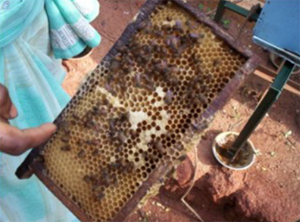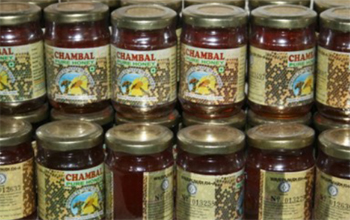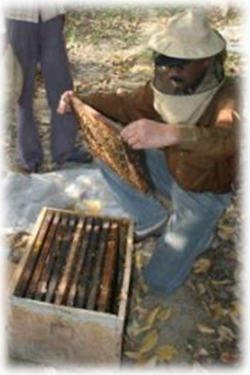Honey and apiculture have had a long history in India. Indeed, paintings dating back from the prehistoric era and representing ancient apiculture methods, were found in Indian caves. Honey was considered as sacred food by the forests’ inhabitants. Then, with the development of civilization, honey acquired a unique status in the life of Indian elders. Thus, it was considered like a magical substance that controlled the fecundity of women, bo-vines, as well as land and cultures.
 Because of the Indian forest’s wealth, apiculture developed because the raw material necessary for the honey production was available for free next to nature. Indeed, India possesses a wide diversity of plants that provide nectar and pollen in abundance in its forests. Thus, with the passing of time, apiculture became a sustainable revenue source for rural and tribal area farmers.
Because of the Indian forest’s wealth, apiculture developed because the raw material necessary for the honey production was available for free next to nature. Indeed, India possesses a wide diversity of plants that provide nectar and pollen in abundance in its forests. Thus, with the passing of time, apiculture became a sustainable revenue source for rural and tribal area farmers.
Moreover, in 1956, the Indian government formed a public law organization, the Khadhi and Village Industry Commission (KVIC). This organization aims at planning, promoting, facilitating, organizing and helping to create and develop khadi village industries in rural areas, in coordination with other organizations committed in rural development wherever it needs. This organization has enabled to revitalize the traditional village industries, especially through the development of apiculture.
To this day, India has kept a real economic potential in the apiculture field. Indeed, the 120 million of listed bee colonies in the country can produce over 1,2 million tons of honey and about 15,000 tons of bee wax a year; and as a consequence provide jobs to 6 million rural and tribal families.
 Wild honey production has gradually been organized by people thanks to the domestication of bees in artificial hives. Situated in various locations, these hives enable the creation of different honey varieties and qualities (70 % of the production is used to make honey), as well as the collecting of other products (pollen, wax, royal jelly). This is how apiculture became a full economic activity.
Wild honey production has gradually been organized by people thanks to the domestication of bees in artificial hives. Situated in various locations, these hives enable the creation of different honey varieties and qualities (70 % of the production is used to make honey), as well as the collecting of other products (pollen, wax, royal jelly). This is how apiculture became a full economic activity.
Bee-keeping is a viable economic and income generating activity if several factors are attended to. Indeed, it needs good bee management, the use of the local vegetable resources and an adaptation to climate conditions. That is why, in addition to its production activity, the Cesci centre offers trainings to people willing to develop or improve their beekeeping activity. These trainings mainly aim at enriching the knowledge about the management of the colonies and the techniques to collect the honey, as well as the sanitary measures that have to be taken into account (hygiene, parasites).
For three days, last month, Cesci organized a bee-keeping training. The trainer was coming from KVIC and taught 24 people, half of whom were women. During the training, he explained to the trainees how important it is to respect nature, to ensure the preservation and multiplication of the species, to make sure that the place where the beekeeping is held is free from water pollution. He also gave some advice on particular care during the rainy season as well as the good maintenance of the and bee boxes through a maintenance diary, describing all activities that have been done to the colonies. He also told people that they should wear a specific outfit when working with the bees to avoid bee stings, for their own security.
Over the last two years, Cesci has organised several bee-keeping trainings with people coming mainly from the surrounding villages but also from the outside. In total, over 40 people have been trained and can now work as bee-keepers and earn a living from the activity, since apart from their own consumption, they will also sell their production to the other villagers and to the market.
 How does it work? |
– Morgane Daget, Lou Crevel, Sandy Courjal
for Ekta Parishad




